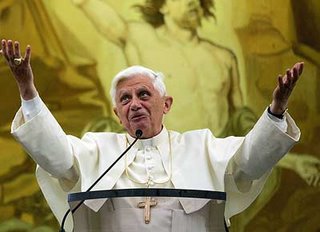 "In Regensburg, the pope exalted the greatness of the Greek philosophy of Aristotle and Plato. He demonstrated that this is an integral part of biblical and Christian faith in the God who is 'Logos.' And he also did this deliberately. When Paleologos held his dialogue with his Persian counterpart, Islamic culture had just emerged from its happiest period, when Greek philosophy had been grafted onto the trunk of Qur’anic faith. In asking Islam today to rekindle the light of Aristotelian reason, Benedict XVI is not asking for the impossible. Islam has had its Averroes, the great Arab commentator on Aristotle who was treasured by such a giant of Catholic theology as was Thomas Aquinas. A return, today, to the synthesis between faith and reason is the only way for Islamic interpretation of the Qur’an to free itself from its fundamentalist paralysis and from obsession with 'jihad.' And it is the only ground for authentic dialogue between the Muslim world and the Christianity of the West."
"In Regensburg, the pope exalted the greatness of the Greek philosophy of Aristotle and Plato. He demonstrated that this is an integral part of biblical and Christian faith in the God who is 'Logos.' And he also did this deliberately. When Paleologos held his dialogue with his Persian counterpart, Islamic culture had just emerged from its happiest period, when Greek philosophy had been grafted onto the trunk of Qur’anic faith. In asking Islam today to rekindle the light of Aristotelian reason, Benedict XVI is not asking for the impossible. Islam has had its Averroes, the great Arab commentator on Aristotle who was treasured by such a giant of Catholic theology as was Thomas Aquinas. A return, today, to the synthesis between faith and reason is the only way for Islamic interpretation of the Qur’an to free itself from its fundamentalist paralysis and from obsession with 'jihad.' And it is the only ground for authentic dialogue between the Muslim world and the Christianity of the West."The rest of the article and articles that appear as the latest offering on the website Chiesa (link on the left of this page) are worth reading to see what is in play with Benedict, that this was not just a mistake, but a deliberate attempt to, in Magister's words,"The dialogue with Islam that [Benedict XVI] he wants to create is not made of fearful silences and ceremonial embraces. It is not made of mortifications which, in the Muslim camp, are interpreted as acts of submission. The citation he made in Regensburg, from the "Dialogues with a Mohammedan" written at the end of the fourteenth century by the Christian participant in the dialogue, the Byzantine emperor Manuel II Paleologos, was deliberate choice".
In fact, so deliberate were Benedict's words that outgoing Vatican Secretary of State, Cardinal Angelo Sodano, who accompanied Benedict on his trip and who, as previously scheduled, was replaced upon Benedict's return to Rome by Ratzinger confidante Cardinal Tarcisio Bertone, SDB, was not allowed to preview the lecture in advance. Why? Because, according Magister, "Whole sections of the text would have been censored". Do not mistake Benedict's words as an unintended blunder, nor as a provocation to violence and conflict. The Manuel II Paleologos quote and subsequent commentary was calculated in order to request that contemporary Islam place its own limit on jihad, that they separate violence from faith, as does the Qu'ran, and that Islam reconnect faith with reason, a la Averroes and others.


No comments:
Post a Comment